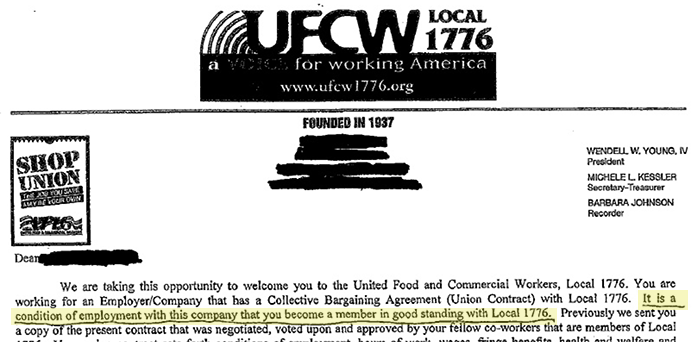“It is a condition of employment with this company that you become a member in good standing with Local 1776.”
That’s UFCW president Wendell Young, IV, writing to John Kabler when he was newly hired as a liquor store clerk. The union’s stance to such new government employees is explicit: Become a member or find another job.
This is illegal. It’s been illegal for decades.

The Supreme Court’s Janus v. AFSCME decision recently ended government union leaders’ ability to charge non-members a “fair share” fee. But union leaders could not force workers into full union membership—that was against the law.
That didn’t matter to Wendell Young and the UFCW.
John Kabler, and others like him, were told—in writing—they must be full, dues-paying members of the union to work for the government. So Kabler joined. Now he’s suing the UFCW for lying to him about his options.
Kabler’s letter is proof positive why our public workers deserve to be informed of their rights.
We’ve known that one-third of public employees aren’t aware of their new rights under the Janus ruling. Now, thanks to John Kabler, we know it’s even worse: Some union leaders are deliberately deceiving workers into joining the union.
This isn't the first time, nor the last, that UFCW leadership has been caught lying. In 2017, the union was fined for failing to disclose millions in TV ads on their lobbying report.
More recently, the union had misinformed workers about their rights during orientation, which was dicussed during a recent PLCB board meeting, along with the UFCW's deceptive lettter. Unfortunately, the board chair refused to approve a motion to tell workers their legal rights, saying a verbal reprimand to tell the union to stop lying is sufficient.
The solution?
Employee rights notification, like HB 785 and SB 371, would ensure workers know their rights and have the facts about their options when it comes to paying a union. A simple notification would empower workers like John Kabler to make an informed choice—and prevent others from being tricked into paying for a membership they don’t want or need.
RELATED : UNIONS & LABOR POLICY




